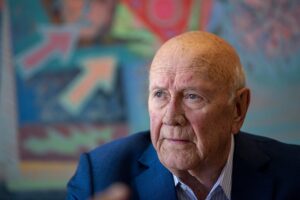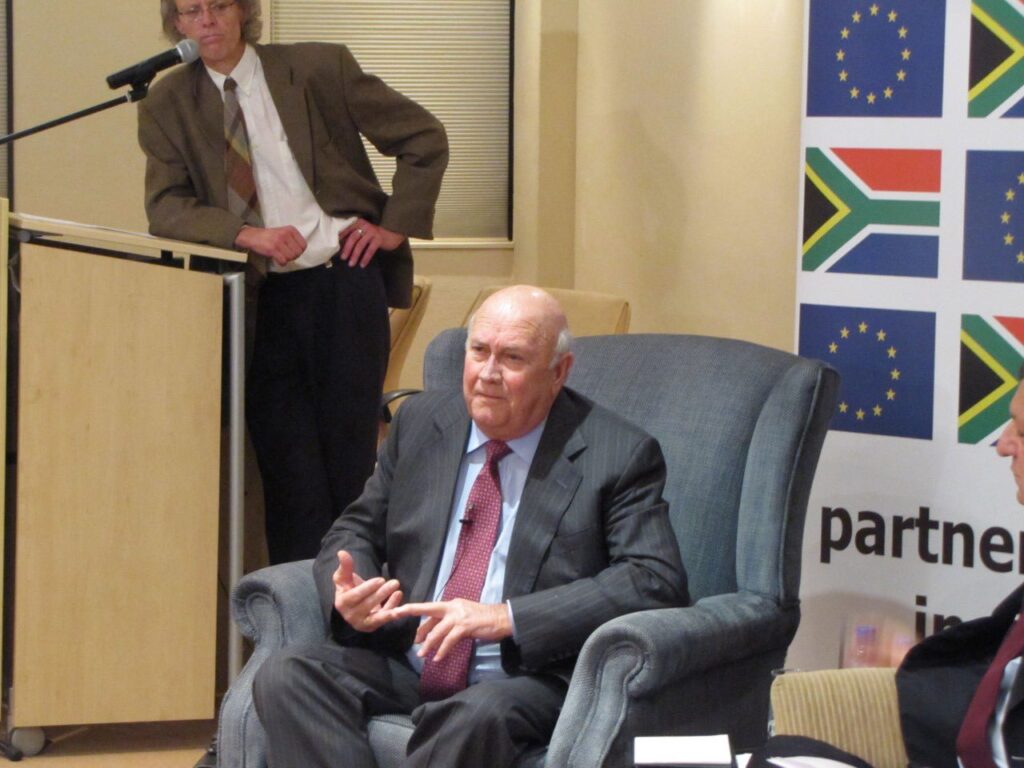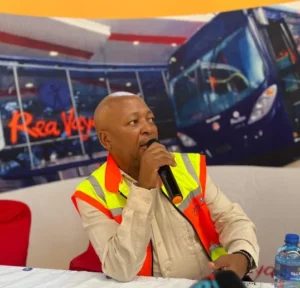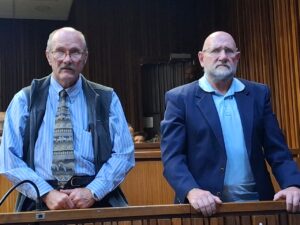By: Sello Theletsane and Ofentse Seanego
The news of the death of the last Apartheid President, FW De Klerk, has invoked differing reactions throughout society.
They range from jabs at politicians and public figures with ties to De Klerk and some rejoicing at the news. Zizi Kodwa and former public protector Thuli Madonsela found themselves trending following the announcement. Many said the passing would heavily hit the pair along with the De Klerk family.
“Check on Zizi Kodwa and Kgosi Maepa” were some of the lines thrown around the twitter-sphere regarding their relationship to De Klerk.
Maepa allegedly served on De Klerk’s foundation while Kodwa was ridiculed for the time he defended him. The Economic Freedom Fighters leadership was leading the ridicule with Julius Malema and Floyd Shivambu, the antagonists.
Malema started his Twitter onslaught with: “Thank you God 🕺🏾💃🕺🏾💃”
Which was followed by another tweet: “My condolences to Mkhuluwa @zizikodwa and kgoši Maepa. Go tla loka bana ba Mokgalabe.”
Shivambu tweeted: “Is Deputy Minister Zizi Kodwa fine?”
Is Deputy Minister Zizi Kodwa fine?
— Floyd Shivambu (@FloydShivambu) November 11, 2021
The Twitter discussions further escalated when it appeared President Cyril Ramaphosa would be addressing the nation intending to announce a state funeral for De Klerk.
Pearl Thusi said that it should not be allowed to happen, and if it does, proceedings must be interrupted.
If FW DE KLERK gets a state funeral… That will be a huge middle finger to the people who suffered under the apartheid regime in this country.
— Pearl Thusi (@PearlThusi) November 11, 2021
“If FW DE KLERK gets a state funeral… That will be a huge middle finger to the people who suffered under the apartheid regime in this country. In fact, we must disrupt that funeral if it’s declared a state funeral. There’s just no way,” she tweeted.
I’m fact we must disrupt that funeral if it’s declared a state funeral. There’s just no way.
— Pearl Thusi (@PearlThusi) November 11, 2021
Another hashtag that trended following the announcement was that of Satan, with many incorporating it into their tweets talking about De Klerk.
The monster who funded the IFP vs ANC civil war in KZN..fucken paid millions; got weapons in Europe to fuel fire, killing innocent families and children
Asikhohliwe Satan! https://t.co/POA7ZrXQFH
— Sphithiphithi Evaluator (@_AfricanSoil) November 11, 2021
@ThisIsColbert tweeted: “Malema did not wait for satan FW De Klerk to die so he can speak of how he “murdered innocent BLACKS during apartheid regime” 😭
Malema did not wait for satan FW De Klerk to die so he can speak of how he “murdered innocent BLACKS during apartheid regime” 😭
He told him LIVE in parliament when it was not fashionable.
History will judge the ANC government harshly. They ALL stood against Julius 😑 pic.twitter.com/OuhFz4pdsG
— YaseB 🇸🇿 (@ThisIsColbert) November 11, 2021
@sheabutterhun tweeted: “Imagine Hitler living amongst the Jews he oppressed & killed, being paid by Jewish taxes, protected by the Jewish government & being given a platform by Jews. It would never happen, but in SA, FW De Klerk, an equivalent of Hitler enjoyed all this. We made that satan comfortable!”
Imagine Hitler living amongst the Jews he oppressed & killed, being paid by Jewish taxes, protected by the Jewish government & being given a platform by Jews. It would never happen, but in SA, FW De Klerk, an equivalent of Hitler enjoyed all this. We made that satan comfortable!
— Dr. S U N R I S E ✨ (@sheabutterhun) November 11, 2021
Political parties, however, indicated his passing saddened them. The Democratic Alliances John Steenhuisen said De Klerk’s contribution to South Africa’s transition to democracy could not be overstated.
Also read: Last Apartheid President FW De Klerk dead at 85
“His decision, within a year of taking over the presidency from PW Botha in 1989, to unban liberation movements, release Nelson Mandela from prison, lift the ban on political marches and begin the four-year negotiation process towards our first democratic election was a watershed moment in our country’s history. De Klerk also took the decision to dismantle the country’s nuclear weapons programme. These things were not considered possible under any of his predecessors,” he said.
His decision, within a year of taking over the presidency from PW Botha in 1989, to unban liberation movements, release Nelson Mandela from prison, lift the ban on political marches and begin the negotiation process towards our first democratic election was a watershed moment.
— John Steenhuisen MP (@jsteenhuisen) November 11, 2021
Steenhuisen added that De Klerk was able to bring the majority of white voters along with him, and this played a critical role in ensuring that the transition happened peacefully and that the 1994 elections, as well as the constitutional negotiations, were embraced by all South Africans.
“This process required calm heads and responsible leadership on both sides of the table, and it was fitting that both he and Nelson Mandela were honoured in 1993 with the shared Nobel Peace Prize,” he said.
Good party leader Patricia de Lille said De Klerk played a critical role in placing SA on the trajectory it’s on leading to the democratic elections of 1994.
“Our deepest condolences go out to his wife, Elitha and the family on the passing of former President FW de Klerk. De Klerk played an important role in our country’s transition from apartheid to democracy and ensuring a peaceful and reconciliatory process. He continued to serve our country after we attained our democracy. May he Rest In peace,” she said.
The Inkatha Freedom Party’s (IFP) Prince Mangosuthu Buthelezi said De Klerk’s passing was a painful moment, not only for his family but for the entire nation. He said the country had lost a champion of democratic principles and constitutionalism who served South Africa long after retiring from governance.
IFP founding President Prince Mangosuthu Buthelezi’s statement of the passing of last Apartheid’s President FW de Klerk;
“This is a painful moment, not only for his family, but for our entire nation. We have lost a champion of democratic principles and constitutionalism who pic.twitter.com/kbYh8g4EvY
— Nhlanhla Mabaso (@_NMabaso) November 11, 2021
“I had the privilege of serving in the Government of National Unity with then-Deputy President de Klerk as we laid the foundation of South Africa’s democracy. I respected his commitment to the wellbeing of our country and recognised in him the characteristics of a patriot. I shall never forget his words upon receipt of the Nobel Peace Prize in Oslo, Norway, on 10 December 1993. He spoke about the fundamental change of heart that became the driving force towards a new dispensation. He said, ‘it was not a sudden change, but a process – a process of introspection, of soul searching; of repentance; of realisation of the futility of ongoing conflict, of acknowledgement of failed policies and the injustice it brought with it,'” he said.

The Desmond Tutu foundation said De Klerk occupied a historic but challenging space in South Africa. The foundation said he was the last head of state of a minority government after 350 years of colonial and apartheid rule, who ceded power to a hugely popular President Nelson Mandela after the country’s first democratic elections in 1994.
“Although some South Africans found the global recognition of Mr De Klerk hard to accept, Mr Mandela, himself, praised him for his courage in seeing the country’s political transformation process through. After Mr De Klerk appeared at the Truth and Reconciliation Commission before Archbishop Tutu, the Archbishop addressed the media to express disappointment that the former President had not made a more wholesome apology on behalf of the National Party to the nation for the evils of apartheid. But in more recent years, the Tutus and De Klerk’s developed closer relations. The late FW De Klerk played an important role in South Africa’s history. At a time when not all of his colleagues saw the future trajectory of the country unfolding in the same way, he recognised the moment for change and demonstrated the will to act on it,” the foundation.
The Nelson Mandela Foundations Sello Hatang said De Klerk would forever be linked to Nelson Mandela in the annals of South African history.
The Nelson Mandela Foundation is saddened to hear of the passing of F W de Klerk. We send our condolences to his wife Elita and their family.
Read: https://t.co/i85RM2PJ5W pic.twitter.com/VIgntXYSSW
— NelsonMandela (@NelsonMandela) November 11, 2021
“As head of state, he oversaw the release of Madiba from prison on 11 February 1990. In 1993 they were jointly awarded the Nobel Peace prize for ushering in a negotiated settlement that led to South Africa holding its first democratic election in 1994. De Klerk also served as deputy president of South Africa in Madiba’s government of national unity until he resigned in 1996,” he said.
WATCH: PAC President Mzwanele Nyontsho responding to the death of former apartheid president FW De Klerk. He said De Klerk’s body should be thrown into the sea instead of burying it on South African soil. Video sourced from SABC News. @IOL pic.twitter.com/Oa2UOvYBz9
— Sihle Mavuso (@ZANewsFlash) November 11, 2021
The Freedom Front Plus’s Dr Pieter Groenewald said De Klerk was a controversial politician who established a new political dispensation in South Africa in 1994.
Groenewald said the direction he chose to take elicited severe differences in opinion and many arguments both for and against his decisions.
“I am of the opinion that Mr De Klerk was ultimately also not satisfied with the outcomes of the political changes. He did not foresee the consequences nor the current decline and decay and he readily admitted that later on. He leaves a legacy of one who brought about drastic changes in South Africa’s political landscape, even though he did not get the results he may have hoped for,” he said.







